GAME PLAN: One Nation’s SA makeover
EXCLUSIVE | When she was in Year 10 at one of the many Sydney schools she attended as a child, Sarah Game – who was last week sworn in as South Australia’s first One Nation MLC – received some stark advice from a well-meaning teacher: she had “no options” for life after high school.
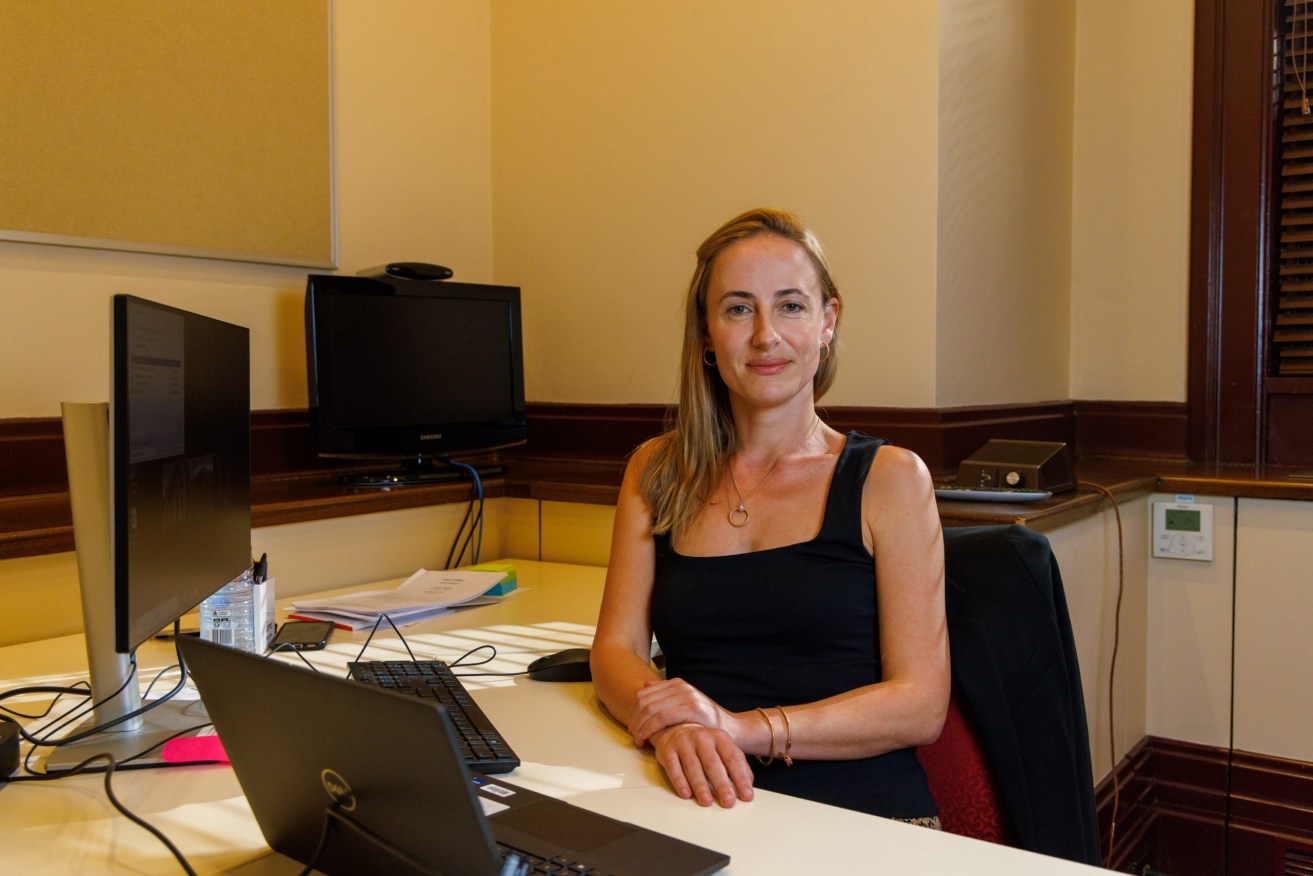
Feet under the desk: One Nation's first SA MLC Sarah Game in her office at Parliament House. Photo: Tony Lewis / InDaily
“I came from a separated family, like a lot of families [and] went to a lot of different schools, for various reasons,” she says now.
“We moved around a lot… I went to about five or six high schools [and] found myself, like a lot of students, not doing very well at school by the start of high school.”
The teacher who delivered the brutal assessment of her prospects was Mr Weathered, who Game now describes as “a very wonderful mathematics teacher”.
“He found me in the hallway once and asked me what I wanted to do when I finished school,” she recalls.
“I had some ideas and he told me ‘you, at the moment, have no options’ – that’s how I was going, I think I was bottom at that school in every subject at the time.
“That was a pivotal moment for me.
“I really had a big panic and decided I wanted to do really well, and started trying really hard.”
It might have been more than Mr Weathered had in mind with his intervention.
“Poor guy – from that day, I was at his office every recess, every lunchtime, with questions about maths,” Game laughs.
But then came another pivotal moment: the realisation that simply trying hard didn’t prompt overnight success.
Introducing Sarah Game. The first ever @OneNationAus representative elected in South Australia.
Thank you South Australia for your support! pic.twitter.com/FKOYFlJK4I
— Pauline Hanson ?? (@PaulineHansonOz) April 27, 2022
“It was a shock: when I started trying, it took a while to see any impact of that – I still failed at everything actually, I think, in Year 10.”
Still, she persisted and “ultimately became a great self-learner, and had teachers that were prepared to guide me”.
When she graduated, she says, it was with a tertiary admission rank of 99.7.
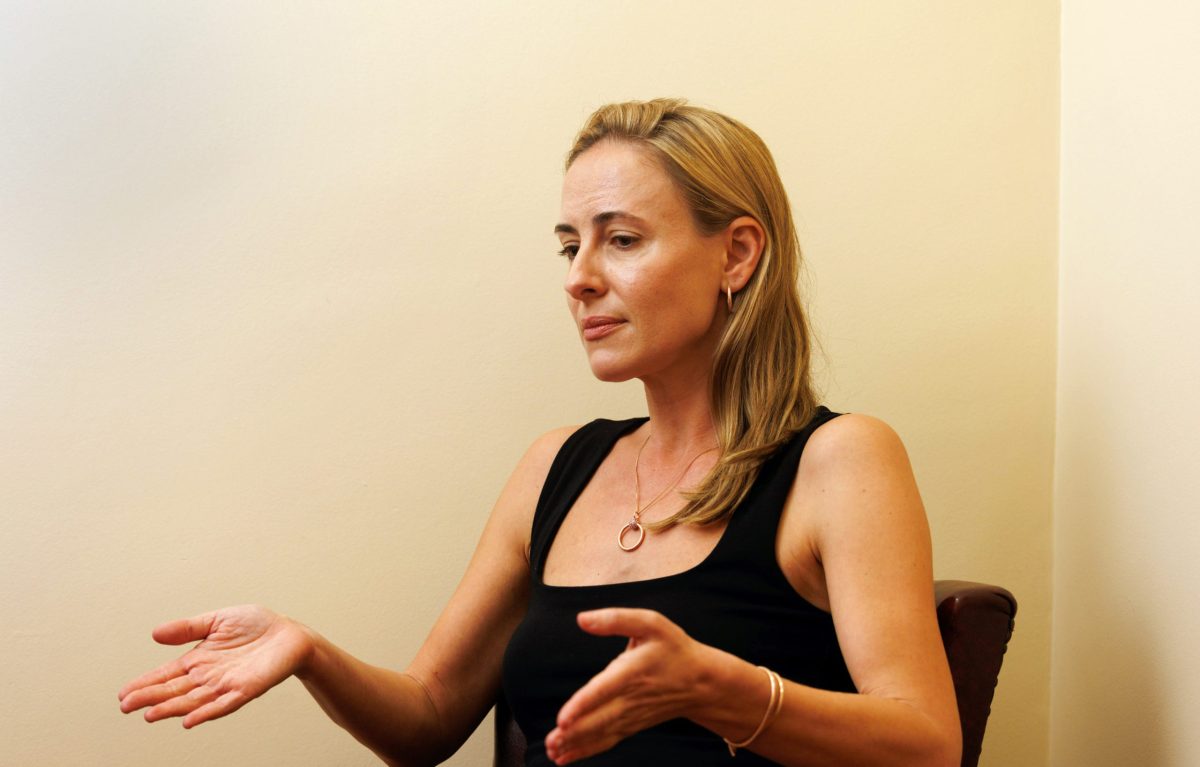
Sarah Game in her parliamentary office. Photo: Tony Lewis / InDaily
“It made me really believe that students are pigeon-holed way too early about their likely outcomes,” she says now.
“I believe quite passionately about the fact a lot of people are not achieving their full potential – I feel if I can do it, anyone can do it… and not based on intelligence, but on hard work and having a bit of belief from a school teacher…
“You don’t thank people properly enough, do you, when you’re a kid? And then you realise a lot later on that actually they made a big difference.”
I guess in some ways it’s quite a conservative party
That episode is a pivotal one behind the fact that if you ask SA’s first One Nation Legislative Councillor what she hopes to achieve in her eight-year term, her response relates to education.
“I would like to know that no matter which government school you send your child to, they’re going to be given the same educational opportunities – and go on to have the same types of employment opportunities – as if they were to go anywhere else,” she says.
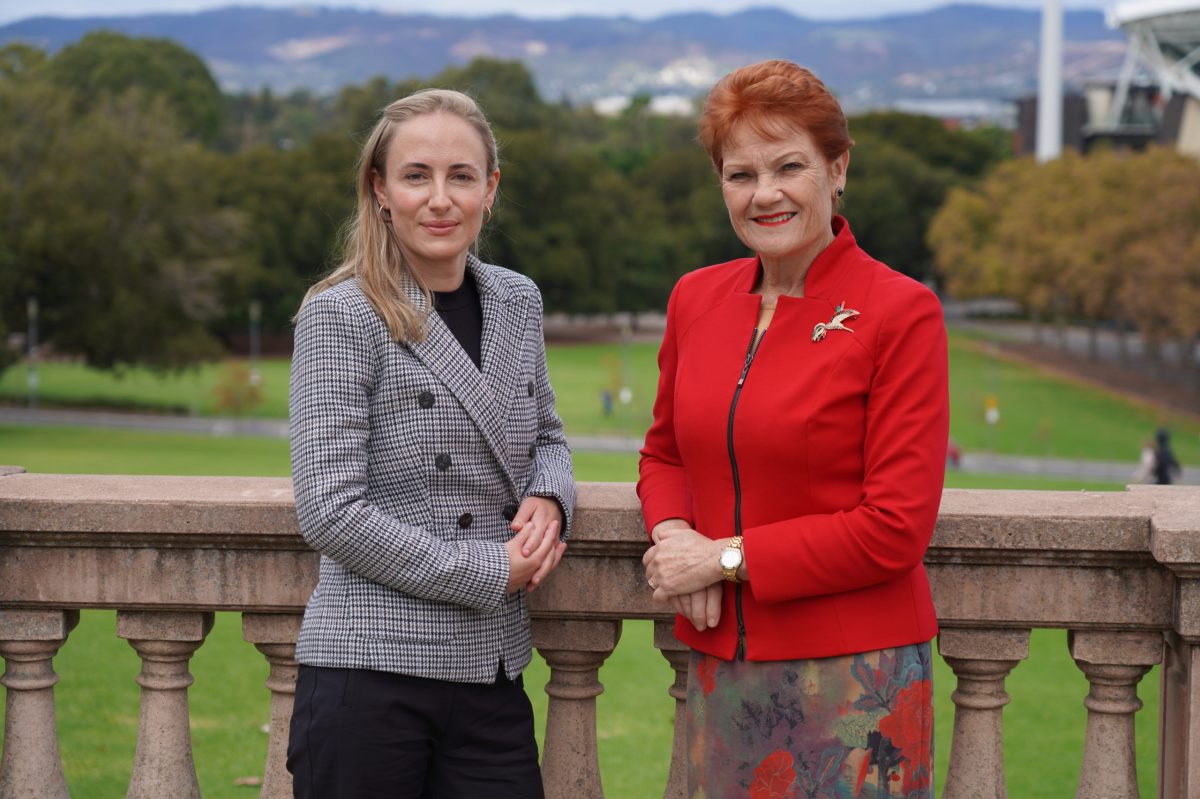
Game and One Nation founder Pauline Hanson. Photo: Supplied
Game never aspired to be a politician.
After studying to become a veterinarian, she took off overseas – and stayed there for a decade.
“I’d always been interested in other cultures and travel,” she says.
That included a year in Berlin, where she “became fluent as an adult in German”, and six months in Paris, as well as visiting the likes of Egypt, Jordan, North Macedonia, Greece.
But she was mainly based in the UK, where she studied for a Postgraduate Certificate in Education and became a teacher.
“The aspiration wasn’t about wanting to be in politics, the aspiration has always been, from a young age, how can you live a meaningful life and make a contribution – that’s guided all of my decisions, the primary one to be a veterinarian,” she says.
“I started to develop, as I got older, an interest in education – I wanted to work with kids and young people and make a difference to them, the way a difference had been made to me.”
She says she opted to start her teaching career in an underperforming college earmarked for closure.
“It was clear to me that the children were not being given an equal opportunity,” she says.
“It was eye-opening for me; there was so much disruption and so much requirement to cater for special needs, but they weren’t resourced – it was very upsetting to see people’s future and outcomes kind of dictated, due to no fault of their own, because of where they were going to school.”
Once it closed, she taught at a state school focussing on “the last couple of years of [children’s] schooling before they go to university”.
“The way we were monitored there was a ‘residual’ system – at the end of their GCSE in year 10 they get a certain grade that gives them a predicted grade for A-level, and as a teacher we were required to try and meet that grade at minimum, and that would give us a zero residual… and if they did well they’d get a positive residual.”
She says her classes’ results were “higher than they’d achieved before”, with a letter from the principal enthusing these were “very unlikely to have been achieved if they’d been taught by anyone else”.
“What it got down to was high expectations,” she says.
“I never look at a student telling me they got a particular grade and have that govern my expectation for that student.”
I just don’t probably like aligning myself with a particular label
The arrival of her eldest children (she now has three, aged 7, 6 and 4, who she raises as a single parent) prompted a move back to Australia – this time choosing Adelaide, where her father lived.
“I wanted them to grow up with a sense of belonging and family, and I didn’t have that over there,” she says.
“I’d always associated Adelaide as a wonderful place that I came on holiday – I had family here and had good memories of it being a family-oriented place with a good quality of life.”
It was also considerably cheaper than Sydney.
“Sydney was an unaffordable place for me to raise a family,” she says.
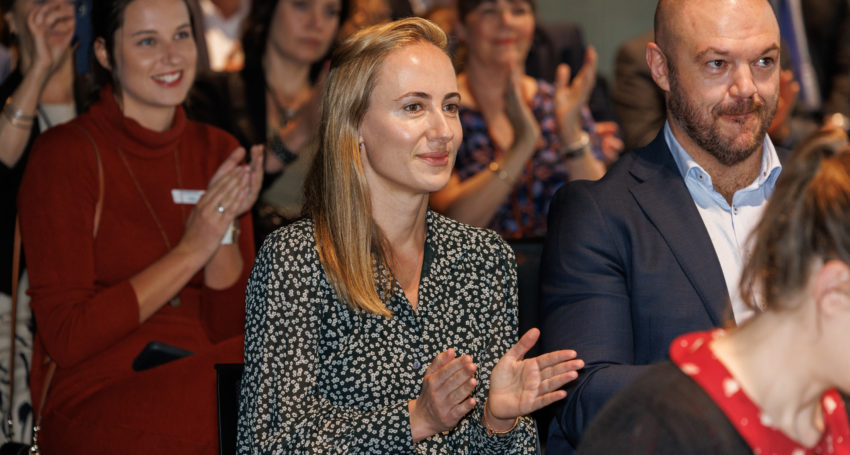
At last month’s vote declaration. Photo: Tony Lewis / InDaily
For a prospective MP who enraged the local media with her reticence before the Legislative Council vote was finally declared last month, Game is an unguarded talker, her voice retaining a hint of the accent she picked up over her decade in Britain.
She came to One Nation through her mother, Jennifer, who has since joined her in SA – as the state party leader and senate candidate. Jennifer herself came to politics late – through a chance meeting with the party’s founder Pauline Hanson, for whom she has since worked.
“I guess that was her thing initially,” Sarah says of her mother’s political involvement.
“We obviously talked a lot about politics at home, from when Mum stated getting involved, [but] I just saw an opportunity there to make a wider impact potentially than I was.”
At the time, she had successfully revived her veterinarian career, but Jennifer’s newfound mission “certainly all fed into my desire and passion to making a difference and I think that’s why Mum approached me about whether I’d like to be more active”.
Was Jennifer’s initial embrace of One Nation a surprise?
“Sort of, but not really,” Game says.
“Mum is quite conservative, and I guess in some ways it’s quite a conservative party.”
So does Game, the party’s first SA MLC, consider herself a conservative?
“I just don’t probably like aligning myself with a particular label,” she muses.
“Then you are expected to behave a certain way, suddenly, about a whole range of issues…
“My approach firstly is: research, research, research… know as thoroughly as I can what I’m talking about; meet people, meet constituents.
“If I’m going to be talking about education, go out to different schools: meet students, meet teachers, meet the parents, meet the relevant people involved – and then I’ll always make what I think is a moral and ethical decision.”
She says “in some ways I am quite conservative but I also think I’m very open-minded”.
“Sometimes you are called to take a particular position and vote on a particular piece of legislation, and you make a decision at that time that this is where you stand to the best of your knowledge… in between time, I probably like to remain open-minded and hear different views.
“I enjoy having friends from different political parties and with different views – you should always be open to hearing things from another point of view: you might get a bit smarter… you might change your mind.”
Let’s be very clear – I don’t support the banning of foreign language teaching in schools
This outlook appears one Game – a last-minute elevation to the top of the One Nation ticket, who was consequently elected having made no public pronouncements whatsoever – is now applying to her party’s political agenda.
Given her personal focus on education, One Nation’s state election education policy from late 2021 bears revisiting.
It states that “poor literacy and numeracy have been identified as a major factor in long term unemployment in SA”.
The party wanted two-thirds of the school day devoted to reading, writing and numeracy and pledged to “introduce legislation to ban unproven and dangerous transgender theory being taught in SA schools” as well as banning “the teaching of foreign languages, to make more time for teaching English”.
But Game, who herself learnt a foreign language during her overseas stints, says this policy has now been amended.
“Let’s be very clear – I don’t support the banning of foreign language teaching in schools,” she says.
“I understand that’s being removed, and we’ve changed direction a little bit with that… certainly, I’d never suggest banning it.”
On the issue of “transgender theory” being taught in schools, she says: “I guess my approach is I want to do more research.”
“I fully support all students having a right to feel safe, supported and included in school… I’d advocate for students of all ages being taught about the value of compassion and kindness towards each other,” she says.
“I really want to understand better from the transgender community… I’d want to do my own research about how that should be handled for those children [but] my priority is to make sure all children feel welcomed, comfortable, safe and secure at school.”
Similarly, she says she wants to look more closely at the abortion debate before following through on One Nation’s stated plan to wind back late-term abortion provisions in recently-passed legislation.
The provision holds that a termination can be carried out after 22 weeks and 6 days of pregnancy if two medical practitioners conclude it is necessary to save the life of the pregnant person or another foetus, if there is obvious or significant risk of serious foetal anomalies, or that the ongoing pregnancy would involve “significant risk of injury to the physical or mental health of the pregnant person”.
“I want to understand the impact on women having made that decision, because that would be a very difficult decision… how do we know they’re really being given all options for other circumstances that might be influencing what would be an extremely difficult decision for that individual,” Game says.
She adds too that it seems “unusual to me there’s no consideration of the father there, or any male rights”.
“If you have a father who’s willing or able to parent that child, it’s unusual that’s not a factor that is considered at all,” she says.
“At this stage I’d be looking to reform the current bill, but I now have an opportunity to speak to people in a different way than I have before [about it], and there’s a lot to be done before that happens.”
One Nation’s state election preferences were decided in part on incumbent MPs’ voting record on the abortion debate, but Game says now: “It’s not about being anti-abortion.”
“The first priority is about making sure that a woman who is making that decision is properly protected and looked after… I’d hate to think someone is in a desperate situation and we haven’t explored all options for that person to give them a chance of having that child [so] I guess I’m concerned we’re not protecting the woman involved enough.
“I’d have to consult a couple of medical professionals but it’s interesting to me those medical professionals don’t need to understand the situation of the father at all.”
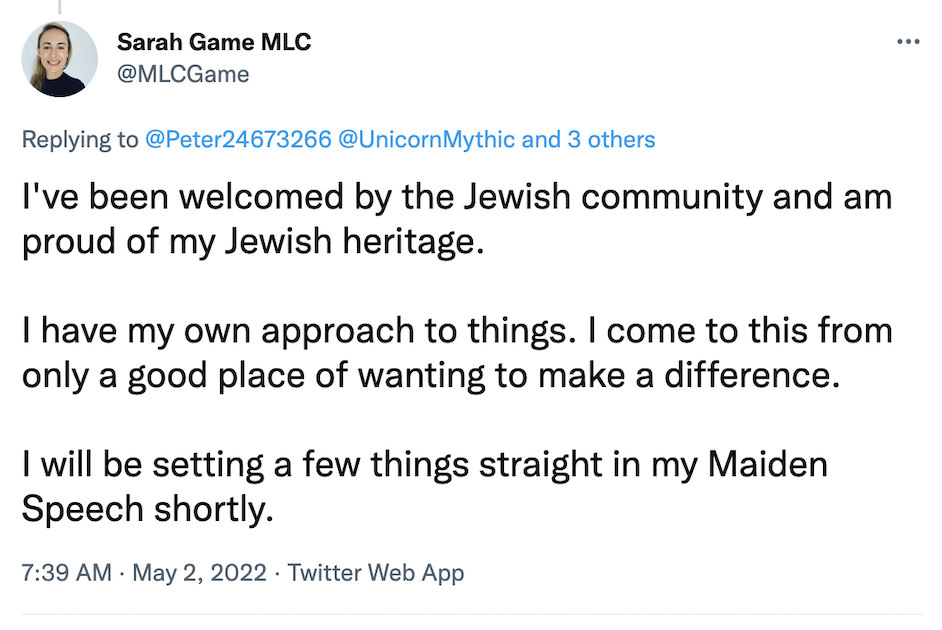
In accepting her seat at the electoral declaration, Game spoke of “our voters having a voice” in state parliament, but defining who those voters are will be the key to the party’s sustained success in SA.
One Nation seems likely to have benefited from the politicisation of the religious Right, galvanised by the passage of legislation on abortion and euthanasia.
But Game herself is not overly religious.
She opted for an affirmation rather than the religious oath on her swearing-in last week.
She has Jewish heritage, but is “not a practicing Jew at all”.
“I wasn’t raised in a practicing household – my mother now, she and her long-term partner, they’re practicing…
“I have been confirmed in the Catholic Church [and] I would say a lot of my values are Christian, [but] I don’t align myself now with any particular religion.
“I guide myself by my own morals and values, and just a desire to make a meaningful life.”
The party’s vote is strong, too, in some regional areas, although Game concedes hers is not a rural background.
She wants to “go out to rural areas and see what’s happening there with education and mental health facilities”.
“Everybody’s got their own way about how they’d like to seek help, but I think it’s a shame when you can’t get face-to-face help… it’s about making sure we’ve got those facilities in rural areas.”
Pauline Hanson told me to be myself; I can have my own approach here
If much of her rhetoric sounds like a departure from the platform broadly associated with One Nation, Game insists the party has given her significant scope to forge her own path.
In a brief media conference shortly after her election was confirmed, she was asked her views on immigration – the policy area in which her party’s founder has long provoked controversy.
Hanson has been outspoken on the race debate since her dumping as a preselected Liberal candidate before the 1996 federal election and, after winning through as an independent, her fiery maiden speech in which she warned Australia was in danger of being “swamped by Asians”.
Last month, Game responded to the predictable inquiry saying: “I support refugee intake and immigration, but it needs to be sustainable and cohesive.”
Asked to elaborate, she said she would “need to make my own inquiries… other than to say I personally support Australia supporting people in need in other communities”.
In some quarters, this was painted as Game “taking aim at immigration”, but that seems a long bow.
“I believe we should have people of all different types of cultures and faiths here, provided we can be cohesive,” she says now.
“I think it’s beneficial for us to have people of all different cultures and faiths here… we want to learn from each other, we want to be friends with each other – it’s best for everybody.”
One Nation’s federal leader’s stance on immigration issues isn’t just limited to history: since her return to the nation’s parliament, she’s advocated a ban on Muslim immigration, a Royal Commission into Islam, a Burqa ban and moved a motion that “it’s ok to be white”.
Nonetheless, Game says: “They’re aware of my views on this.”
“I’ve spoken to my mother about this,” she adds.
“I’ve obviously been to Islamic countries, most of the people there are very welcoming and kind, peaceful people and we want to learn from each, and I support – very clearly – people of all different religions and cultures immigrating here and living here, provided it can be done in a cohesive way so that we can learn from each other and have a more interesting society.”
She says she has “met with Pauline, who I liked very much on a personal level, and think she’s a very resilient hard-working person”.
“She told me to be myself; I can have my own approach here,” she says.
Asked if she understands that Hanson’s longstanding rhetoric on race and immigration has created a prism through which many Australians view One Nation – prompting the sort of questions asked at her debut media conference – Game concedes: “I guess sometimes how you say things influences what people hear.”
“The way I look at those comments is, it’s about putting South Australians who live here first – regardless of where they were born,” she says.
“It’s got nothing to do with race or anything like that: if you live here already, you’re the priority.”
Everyone has been so nice and very supportive – including the Greens
Game was quietly elevated to the top of the party’s ticket shortly before polling day.
She had previously helped her mother “setting up memberships” but her first significant involvement was as Jennifer’s running mate – albeit in the impossible-to-win second spot on the ticket.
“I was aware she wanted to put me second on the ticket quite a long time ago, but I guess we didn’t really anticipate that coming to fruition – we never really anticipated getting two people in,” she says now.
“In terms of when it became a reality that I might go first on the ticket – that was not until February this year.
“I just understood Mum wanted to put me forward as a possible candidate because she’d changed her ambitions a little bit, and ultimately she made that decision [to shift focus to the senate] quite late.”
After votes were cast she had several weeks to adjust to the idea of becoming an MP, before her election was confirmed late last month.
At the time, the SA Greens expressed their outrage about the party’s success, deriding “One Nation’s divisive, ugly style of politics”.
But Game says the animosity has not carried over in the corridors of her new parliamentary workplace.
“Everyone has been so nice and very supportive… MPs from all parties – including the Greens,” she notes.
Her seat in the Upper House is alongside the parliament’s two Greens MLCs, and she insists: “I’d say on a personal level, we get on very well.”
“From every direction… SA Best, Liberal, Labor – I’ve had some Labor MPs bring me flowers – I’ve been overwhelmed with how warm everyone’s been, in a genuine way… helping me find where things are, helping me understand procedures; it’s been a very warm, positive experience.”
However, she’s less impressed that parliament was recalled so soon after the declaration of the Upper House ballot, before an office or staff had been properly allocated, saying: “The reality is they are not ready to get new members up and running for parliament in that time… it lacked complete consideration for our party.”
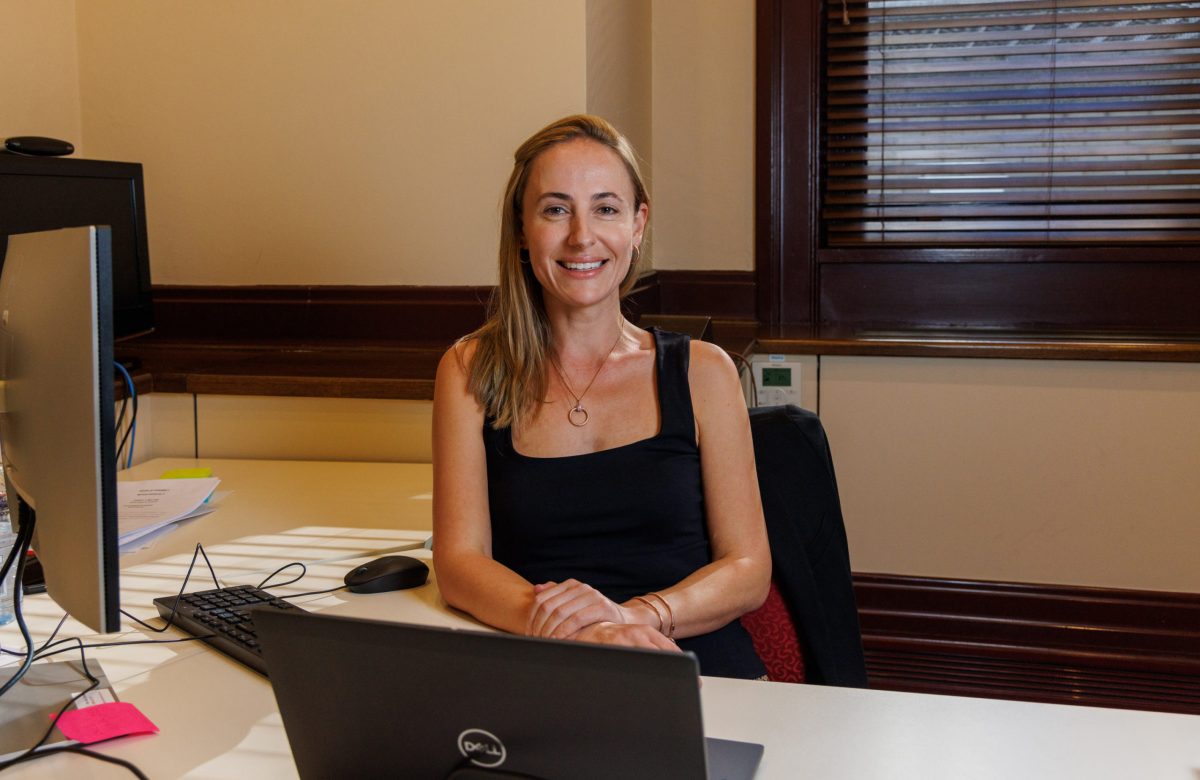
Behind her Parliament House desk. Photo: Tony Lewis / InDaily
She will speak next week, before her maiden speech, on the Government’s planned pandemic-prompted changes to the Public Health Act, saying: “Generally we support a movement away from managing the pandemic under the Emergency Management Act [but] any legislation needs to be looked at very carefully.”
“We want to make sure personal freedoms are also protected and legislated for, and there are proper constraints in place on any powers being committed,” she says.
“It shouldn’t be rushed – it needs proper consultation and proper consideration.”
But the reality is the Malinauskas administration has more freedom to rush its agenda through parliament’s house of review than any government in recent decades, after re-installing Liberal veteran Terry Stephens in the president’s chair.
The move allows Labor to maintain its nine votes on the floor of the house, meaning it only needs either the Greens or SA Best on side to pass any given Bill.
The Liberal Opposition, on the other hand, would need both crossbench parties to block the passage of anything.
One by-product of all this is that, despite its triumphant breakthrough into SA parliament, One Nation has been effectively sidelined.
“Terry has been very supportive and very helpful in a practical way, but I guess I am surprised… that the Liberal Party would seemingly be [supportive of] that decision as well,” Game says of the Machiavellian machinations that greeted her on her first sitting day.
“I guess maybe I’m optimistic and I’m hopeful we won’t just be rubber-stamping legislation through.
“We’ll just go piece by piece… but if it becomes apparent they’re putting sloppy legislation through that’s not being properly considered, I’ll be being very vocal about that… and I don’t think that’s in their best interests to behave in that way… so I guess for me, wait and see how it pans out.”
I do feel aligned to the party
In the meantime, it’s unclear just how One Nation’s first foray into state politics will play out – and to what extent its unlikely debutante will echo the script from Canberra, let alone Queensland.
“I do feel aligned to the party,” she insists.
“The way I see it, it’s about having smaller government, greater personal freedom and a unified Australia – and all of those things I very much identify with.”
She describes herself as “an extremely hard-working and committed individual” who reconciled herself to her new path in politics “as soon as I realised this was definitely the route I was going to take”.
“It’s a privileged situation, and I’m a big believer that with privilege comes responsibility… so I feel a huge responsibility and weight now to ensure that people who voted [for One Nation] feel properly represented, and that we keep our election commitments – and to work hard and make an impact.”




